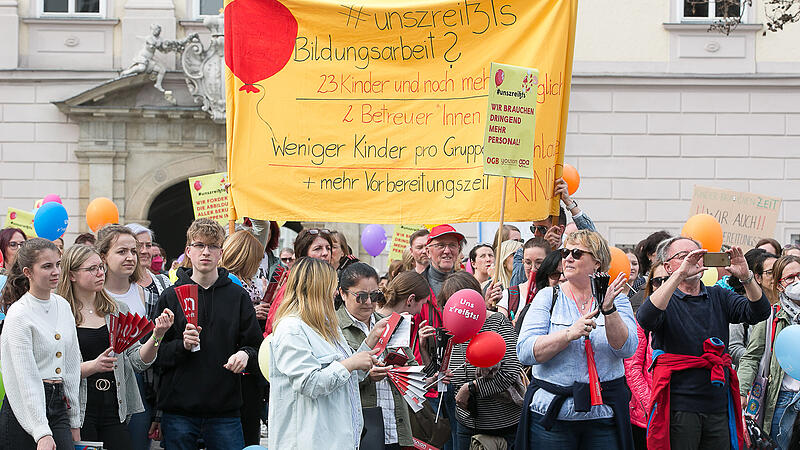“I can’t work as badly as I’m paid for,” says one of the posters that Vanessa Zampieri and Eva Hausleitner-Forrester are holding in their hands. The two educators from the Waldorf kindergarten in Wels are among the approximately 700 people who demonstrated in front of the Landhaus in Linz on Tuesday afternoon for better working conditions in the field of elementary education.
“Our main concern is fair wages,” say the two. “Because we work in a semi-public kindergarten, we are paid at the lower end of the collective agreement. We get even less than the teachers in a municipal kindergarten.”
The trade unions Younion and GPA Upper Austria have called for the protest, and the Conservation Conference, which represents the sponsors parishes, Caritas, church associations and religious orders, also supports the action. What particularly annoys the organizers: Since last summer, they have been waiting for a round table with State Education Minister and Deputy Governor Christine Haberlander (VP). It still hasn’t come about.
Hardly any preparation time
There is a need for action at every turn. “The group sizes would have to be reduced,” says Bianca Spitzer, head of the Reintal kindergarten in Laakirchen (Gmunden district). “Two adults for 23 children are not enough, individual support is hardly possible. Our breaks often mean that we quickly snack next to the children. Otherwise none of them go out.”
The shorter preparation time is one of the criticisms of Andrea Kranewitter and Katrin Döberl-Schaumberger, teachers at the parish kindergarten in Ried in der Riedmark (Perg district): “I only have five hours with a weekly working time of 33 hours,” says Kranewitter.
Word of the precarious working conditions has already gotten around to the teachers in training. Stefanie Hanreich and her classmates from the part-time college at the educational institute for elementary education in Linz wrote a letter to the editor of the Upper Austrian News, in which they pointed out: “It’s frustrating when we learn the current state of the theory in class, but then in the We can see in practice that we cannot implement it like this,” says Hanreich. The students want more recognition and appreciation from society for this profession.
Haberlander refers to the federal government
State Councilor Christine Haberlander pointed out on Tuesday that a corresponding agreement had to be reached with the federal government, after which she would “invite the system partners to a round table in the first half of the year to jointly consider how we can improve the situation together”. .
Source: Nachrichten




